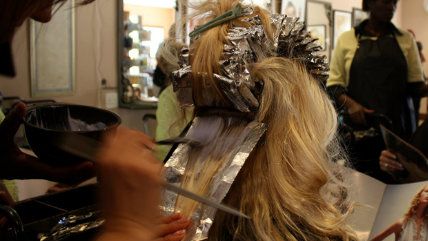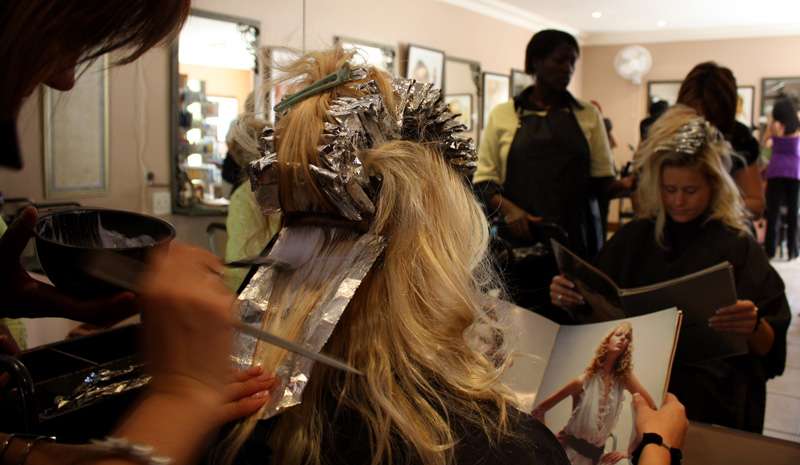Beauty School Syllabus Now Includes Human-Trafficking Awareness Training
In Ohio, learning to spot the "signs" of human trafficking is now a requirement for cosmetology licenses.


Cosmetologists are the latest to fall prey to human-trafficking hysteria. Convinced there's some sort of sex-trafficking epidemic happening—or at least invested in making it appear that way—federal officials have been enlisting everyone from flight attendants to strippers to hotel staff for training on how to spot the "signs" that someone is being forced into prostitution or other labor. Now, Ohio authorities have made human-trafficking awareness training a must for anyone who cuts hair.
"They're maybe looking to us because we tend to become really good friends and close with many of our clients," Pamela Voisard, a barber and cosmetologist, told Ohio's 10 TV.
Call me crazy, but I don't see sex-trafficking victims getting their hair and makeup done frequently. But despite the utter illogic of the proposal, Ohio's State Cosmetology Board recently approved a requirement—pushed by the Ohio Human Trafficking Task Force—that human-trafficking awareness training become a mandatory part of obtaining a cosmetology license. Those already possessing a license have until January 2017 to complete the new training.
According to the head of the state cosmetology board, Christopher Logsdon, the training will cover "the signs and indicators of trafficking" as well as how to "direct any tips of suspicious activity to the National Human Trafficking hotline"—a government-funded but privately run hotline which is becoming increasingly mandatory to post in places of business.
A lot of people will say something like, "who cares? It's only an hour long training session. How can spreading more awareness to more people be bad?" Let me count the ways!
1. Occupational licensing is already a scam, and it hurts the poor the most.
In order to get a state permission slip to make a living, people who want to cut hair, paint nails, give ghost tours, or any other number of other things must fork over hundreds, sometimes thousands, of dollars and spend many hours learning skills that, in many instances, aren't even applicable to their jobs. This can be a barrier to entry for anyone, but especially for low-income individuals. Yet should they forgo the state permission slip, they face not only losing their jobs or businesses but also being fined. Anything that adds more time, expense, and effort to the occupational licensing process without a direct relation to consumer safety should not be allowed.
2. It diverts resources that could go to actually helping trafficking victims.
Many of the efforts directed against human trafficking these days are of the "awareness raising" variety. A recent report commissioned by the Department of Justice found that after increased criminalization, the biggest portion of state anti-trafficking effort goes toward awareness-raising. But developing and disseminating all those posters, brochures, stickers, and training modules isn't free. It takes up staff time and, more importantly, state money. So if the government is going to devote funds to anti-human trafficking efforts, wouldn't it be better spent on strategies that actually make an impact?
The top things victims' advocates say would make a difference are more beds at emergency shelters and more programs to help sex- and labor-trafficking victims find jobs and temporary housing once they're free. These are the areas U.S. anti-trafficking efforts routinely neglect, however, in favor of more extensive criminalization of consensual sex and making sure every gosh darn makeup artist, hotel maid, and airport-hamburger-slinger in America gets woke about how someone's shabby luggage or refusal to make eye contact probably means they're a sex slave. Which brings me to…
3. It's all part of a massive, coordinated (and dangerous) propaganda push.
Yes, I know, this is where I start losing people—propaganda? Please. Libertarians, SMDH. But what else would you call factually untrue, government-sponsored information in service of political goals? I've been following anti-trafficking awareness efforts for a few years now, and the primary motif is "educating" people about four things:
- human trafficking is everywhere, including in your own backyard;
- it's getting worse;
- much of what people think of as prostitution is actually human trafficking; and
- even when sex workers say they aren't victims, they actually are, because women don't have agency they're just too brainwashed by an evil pimp to admit it or they may now be working on their own but only because they were forced in originally, at a young age, and it's all they know.
These are the major tenets of every trafficking awareness program I've seen, be it aimed at school teachers or strip-club owners or the men forced to attend "john schools." The statements from people who have received this training—either as quoted in the press or in conversations I've had with them personally—almost invariably say some variation on "I didn't realize it before, but now I see that (insert one of four statements above)."
But none of those main "awareness" themes are supported by facts. Not one. And in addition to filling hairdressing training materials, they're also being used to justify an increase in the number of undercover police stings targeting adult sex workers and their clients; harsher penalties for sex workers, and their clients; an expansion of police wiretapping and civil asset forfeiture powers; expanded sex-offender registries; mandatory posting—under threat of civil and sometimes criminal penalties—of anti-trafficking awareness materials; the creation of new mandatory minimum prison sentencing schemes; increased monitoring of online speech by the federal government; and ever more taxpayer money being devoted to all of these things.
Why would they do this? Well, my pet theory is that using the drug war to justify tough-on-crime measures has become unpopular, so officials needed a new scapegoat. Prostitution is prevalent almost everywhere, so the parameters are right—except most people these days don't much care about prostitution between consenting adults, especially when it's off the streets and out of sight. So defining all prostitution as sex trafficking has become a political necessary. But that's just one of many factors at play—anti-prostitution zealots on the right, anti-sex-work feminists on the left, the nonprofit industrial complex, and moral panics all play a role too. For a more in-depth analysis of all this backed by research and stats, see my November 2015 Reason feature on how "The War on Sex Trafficking Is the New War on Drugs."


Show Comments (87)